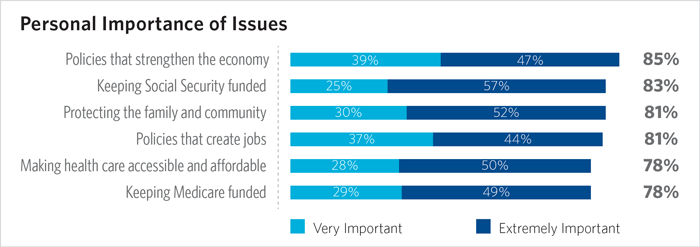Strong Interest in Social Security and Medicare
Entitlement programs like Social Security and Medicare garner some of the highest interest from the American people. In terms of personal importance they fall alongside strengthening the economy and the job market as the most personally important issues and policies facing the country today.
In fact, Social Security is consistently a top motivating issue in driving Americans to get out and vote, with 35% of Americans choosing it as a top motivator from among more than twenty issues ranging from fighting terrorism to renewable energy. By contrast, keeping Medicare funded, which also scored as one of the top issues, was selected by 20% of Americans.

Building Support For Entitlement Reform
It is clear that Americans have a strong interest in the health of these programs. Focusing on the necessity of putting them on a sustainable path to ensure their survival well into the future can help build support for reform.
“Social Security, Medicare, and Medicaid will run out of money unless they are reformed by targeting the benefits more toward those who really need the help. Keeping the programs as they are would unfairly place an additional tax burden on our middle class and future generations.”
50% more interested and favorable toward conservative vision
Similarly, drawing an accurate picture of the size of these programs as they currently stand and the weight they place on the budget can have a noticeable impact. Recent research on government spending in the Opportunity for All: Favoritism to None policy vision identified the following as a powerful way of driving attention to this concern: “Popular programs like Social Security and Medicare, if left unreformed, will soon devour nearly two-thirds of all tax dollars.”1
With the high levels of importance placed on the future of these programs and a majority of Americans saying conservatives are best equipped to lead on this issue, there is real opportunity for engaging the American people on the need for sustainability, choice, and a secure future for programs that serve those in need.
Source: Online survey using a national representative sample of 1,019 U.S. voters conducted December 9–16, 2014 with a margin of error of ±3.0%. 1. Online survey using a national representative sample of 6,246 U.S. voters conducted January 12–22, 2015 with a margin of error of ±1.2%.




